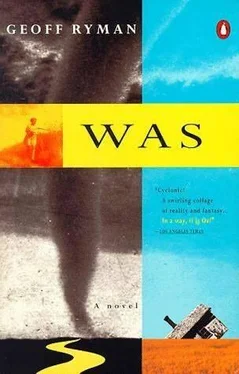The water was cool, and she felt underfoot again the stone that was rippled like a sandbar. Dorothy walked as close to the beast as she dared.
Then she put her spirit into the buffalo. She felt the vast, exhausted bulk that had gone as immobile as stone; she felt the covering of wiry, curly hair caked with mud. She felt the tail wet and heavy, beyond flicking, floating in the shallow water. The buffalo was settling into the stone. Its huge pink tongue was lolling in the water.
Don't let me die alone, the buffalo seemed to say to her. Buffalo live together; we are taken by the wolves if we cannot keep up a march. If we lag behind, we are quickly torn away, but we do not understand loneliness. Don't leave me alone.
And Dorothy knelt close beside him and stroked his mighty head and the huge hump of his shoulders, and she felt how once he had been a king. No king should die unmourned. He went very still. Breath bubbled out of him in the water. His hide twitched.
Give me to the river, the buffalo said. Hide me away from men. I don't mind the coyote or the vulture; I don't mind the beetle or the muskrat. But I don't want men to get me. I don't want them to hang my brow and horns on their wall; I don't want my skin on their floor or on their backs. Let me go whole back into the earth.
Dorothy tended the king until he died. She stroked him until she was sure he was dead, until the chest no longer heaved with breath, until there was no bubbling in the water, until the flesh was still.
Then Dorothy tried to roll him over the edge. She was very strong and perhaps the current helped. She succeeded in half rolling the corpse of a bull buffalo up onto his haunches.
It was as though she had sparked something. The legs suddenly twitched. Yes! the muscles seemed to say, Yes! Dorothy heard the hooves scrabbling on the stone.
As though the buffalo had tried to leap into Heaven, the corpse launched itself into the air. It shivered its way over the edge of the rock, a moonlit sheen of water pouring over its shoulders. It fell over the horseshoe plunge, where Dorothy had once hidden herself.
The buffalo fell between the waterfall and a large boulder. He landed, with a rearing up of his small legs, which were now limp again. He reared up and settled back and it was as if he had sighed with relief, accepting the embrace of stone.
There was a large branch stranded on the edge of the fall, and Dorothy dragged that forward until it fell too. It slipped slowly sideways, hardly falling at all, it seemed, the heavier end of its trunk crashing down onto rocks and puddles. The upper boughs lashed the air at about the level they had been at before. Except that the buffalo was covered, hidden perhaps, safe perhaps from men.
Then Dorothy stumbled back home toward the summer kitchen. Her clothes were wet, but there was no one at home who would mind. Who needs dreams? she thought. This was better. As she walked, she felt her eyelids drooping. She picked up a stick to lean on.
It was blue-gray in the sky by the time she reached the woods over the farm. She planned to walk down out of the trees, unseen. She was idly slashing at the hickory with the stick. She thumped a large tree trunk and realized that it was hollow.
There's a hollow branch up there, she thought. And there was. Now how did I know that? She reached up into a broken branch and felt leaves and pulled.
Something came out, brown as Kansas. She shook it. It was a child's dress, very lacy. Would have been white once. And there were tiny, flaking platelets of metal sewn onto it. Dorothy held it up against herself. Definitely a child's dress.
Something stirred, as if there were something else alive within her. She felt it move. It was as if there were a dreamworld somewhere, which she could dimly see. Had she left the dress in the tree?
Dorothy remembered Wilbur. She remembered the first day and the train trip and something about staying with people on the way to Kansas. There had been another life, as if the world had divided in two. She had not always lived with Aunty Em. Dorothy rolled up the tiny brown thing and hid it in her coat.
Back down on the farm, there was nothing to greet her or welcome her. She dropped down onto her mattress and sank into the deepest kind of sleep, as deep as a well and dreamless. All unaware, she had dammed up a reservoir of dreams. They grew heavy, as if hairline cracks ran through the bones of her forehead.
As Dorothy worked that day, she stumbled. She stared ahead, terrible rings around her staring eyes. Aunty Em said, "I reckon you best rest a spell, Dorothy." Dorothy looked back at her, almost refusing. But I don't want to rest, she thought. I might have the dreams.
"Go on and lie down." Aunty Em's voice sounded sad and weary. Dorothy noted how it sounded even as she turned to obey automatically. It was easier to obey than to try to think. She plodded into the barn. Her feet were like heavy stones. She slumped down onto the bales of hay and curled up on one of them, boots drawn up under her knees. She stared ahead. She would not close her eyes. Aunty Em had told her to lie down, but she would not sleep.
Aunty Em came in.
"You're still awake," Emma said in sorrow.
Aunty Em came and sat next to her on the straw. "You don't sleep, do you, Dorothy?"
Aunty Em sighed when Dorothy did not answer. She moved closer and there was a rustling of hay. "Your clothes are soaking wet and your boots are covered in mud and grass and pine-tree needles. Where do you go, Dorothy? Where do you go at night?"
Dorothy didn't answer. She stared ahead. Aunty Em began to stroke her hair, as Dorothy had stroked the buffalo.
"What happened, Dodo? What happened to you? You were such a beautiful little girl. You'd always help around the house and were so kind to your poor old aunty. And you used to make me laugh. Like when you told off all those old ladies about the way they treated the Chinawoman. Remember? Or when we caught caterpillars and put them in preserving jars with grass to see if they'd turn into butterflies. I thought that was the funniest thing."
A shabby black sleeve on bone-thin arms with a veined and muscular brown claw at the end, smoothing down Dorothy's hair, trying to untangle it.
"Did we do anything, Dodo? Was it something we did? Is it something we can undo?"
Dorothy couldn't think. Yes, probably, she thought, but she wasn't sure she had said it out loud.
"Dorothy," said Aunty Em. "Please come back. You were the light of my life. You were what kept me going all those years, just to hear you laughing, or naming the birds, or working away at your books."
Dorothy thought just two words. The words were: too late. It was a very simple, very final thought, and she wondered how something so simple could be so complete. Too late. She could not think much beyond that and she did not need to.
"Come on, up. Let's get you into the house." Aunty Em coaxed her to her feet and led her up the wooden steps to the summer kitchen.
The next Sunday, Aunty Em went alone to Meeting. She went to howl in tongues, flushed with the love of Jesus, a stick jammed between her teeth to keep her from biting off her tongue. One of Dorothy's worst dreams had been about all of Aunty Em's talking tongues slithering out of her mouth, hydra-headed.
Uncle Henry was out communing with his fields, which meant masturbating into the dirt. It was a good summer, warm and gentle, though today was surprisingly cool.
Dorothy finished all her chores. She did them without questioning. She washed Aunty Em's clothes, her nightdress. She washed Uncle Henry's socks and his loose and baggy underwear. She went out to the clothesline with a basket and pegged all their clothes up on the line.
Then she stood up, as straight and sudden as if someone had called her name. That was it. She was finished here.
Читать дальше












